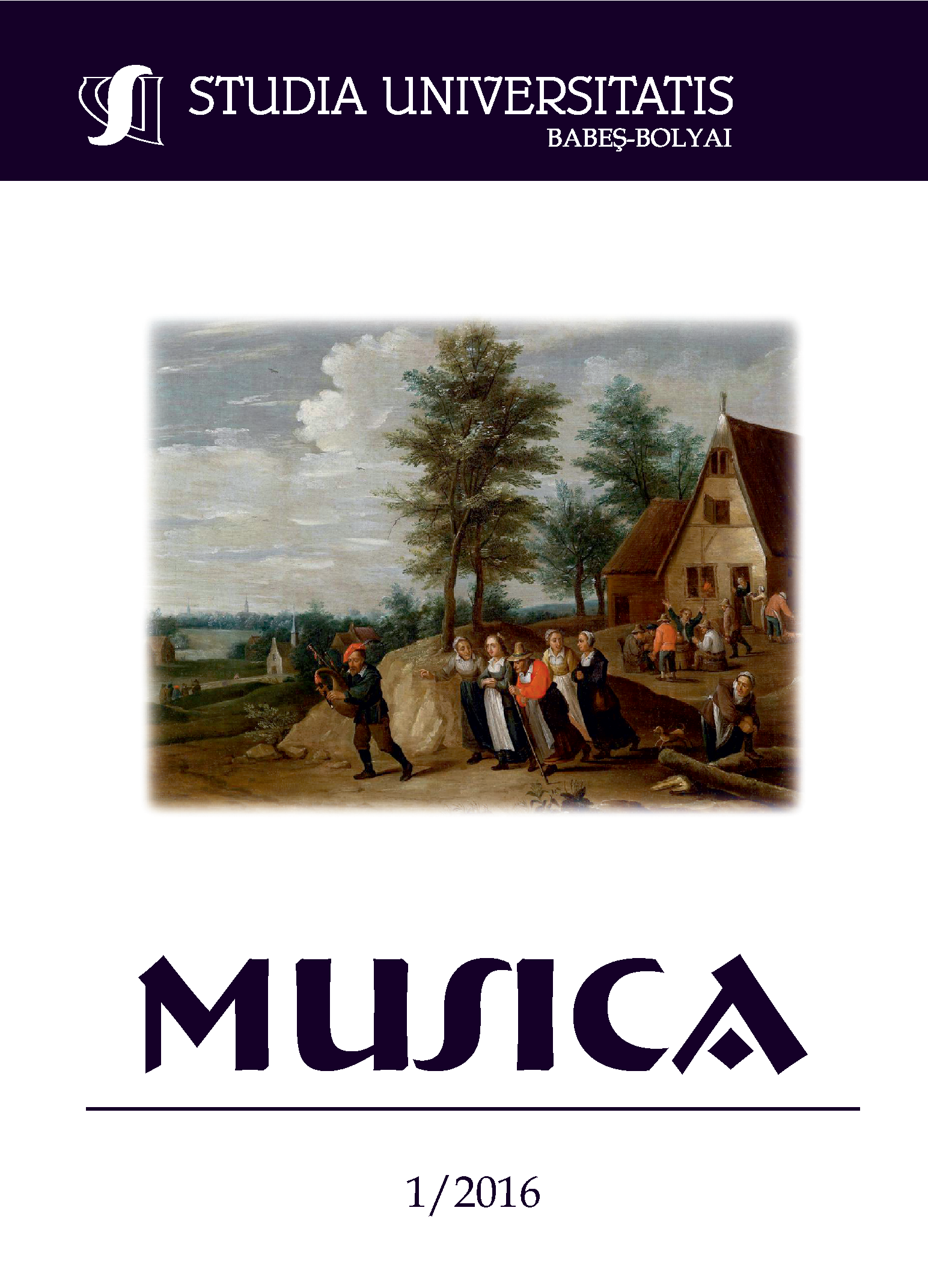EXPLORING THE ELEMENTS OF ATTITUDE TO MUSIC AMONG STUDENTS OF TEACHER TRAINING
Keywords:
musical experience, music therapy, musical knowledge, musical tasteAbstract
This paper explores the viability of a questionnaire, which measures students of teacher training in the aspects of their musical attitude. In order to accomplish the aim, a pilot study was designed. The sample (N = 60) is based on students specialized in music and science and participating in the survey on a voluntary basis. The measuring instrument ignores the aspects of specialization, gender and grade and time stability. Since these aspects were statistically verified, this questionnaire can be applied to measure and evaluate the -musical attitude and its development. The modification of the responses indicates the development.References
Bagdy Emőke (2005): On the way to the music and the soul of man. In: Lindenbergerné Kardos Erzsébet (ed.): Music Therapy. Text Collection. Selected papers from the scope of art therapy from the world of science and the media. Key to the Music Publisher, Pécs. p. 174-181.
Alexander Bernát (1969): Art. Selected essays. Academy Publisher, Budapest.
Bense, M. (1965): Aesthetica. Einführung in die neue Aesthetik. Agis, Baden-Baden.
Csillagné Gál Judit (2008): Psychological examination of pieces of music information. Flaccus Publisher, Budapest.
Dombiné Kemény Erzsébet (1992): Presentation of musical abilities via standard tests, comparison and application of national experience. In: András Batta Czeizel Endre (eds.): The roots of musical talent. Mahler Marcell Foundation - Arktisz Publisher, Budapest. p. 2007-247.
Dombiné Kemény Erzsébet (1999): Handbook of musical ability tests. Vántus István Company, Szeged.
Echo, U. (2006): An open plastic. Europe Publishing, Budapest.
Erkkilä, J. (1997): Musiikkin merkitystasot musiikkiterapian theory ja kliinisen käytännön näkökulmasta. Studies in the Arts of Jyväskylä Jyväskylän yliopisto 57, Väitöskirja.
Gabrielsson, A. (1995): The study of music experience in music psychology. In: Manturzewska, M., Miklaszewski, K., Bialkowski, A. Burke, R. (eds.): Psychology of music today. Fryderyk Chopin Academy of Music, Warsaw. p. 85-90.
Hartmann, N. (1977): Front and back to the non-descriptive arts. The musical beauty. In Hartmann, N.: Aesthetics. Magyar Helikon Publisher, Budapest. p. 187-190.
Jan, S. (2000): Replicating sonorities: Towards the memetics of music. Journal of Memetics, Vol. 4. No. 1. p. 1-26
Janurik Márta and Józsa Krisztián (2013). The development of musical skills between age of 4 and 8, Hungarian Pedagogy, Vol. 113. No. 2. p. 75-95.
Konta Ildikó (2010): Social skills development with music therapy devices in elementary school. In Zolnai Anikó and László Kasik Aniko (eds.): The development of social competence in theoretical and practical foundations. National Textbook Publisher, Budapest. p. 233-247.
Laczó Zoltán (2003): The musical understanding, skills, knowledge, aesthetic, psychological and pedagogical issues. Parlando, Vol. 45. No. 5. p. 2-6.
Lissa, Z. (1973): Music and silence. Thought Publisher, Budapest.
Lissa, Z. (1975) Eben des musikalische Verstehens. In Lissa, Z.: Neue Aufsätze zur Musikästhetik. Heinrichshafen's Verlag, Wilhelenshaven. p. 55-111.
Losonczy Ágnes (1964): A musical-sociological research. Hungarian Music, Vol. 4. No. 3. 57-66.
Losonczy Ágnes (1969): The sociology of musical life. Composition Publisher, Budapest.
Lukács György (1972): Additions to the history of aesthetichs. Sower Publisher, Budapest.
Lukács György (1997): The border issues of aesthetic mimesis. The aesthetic peculiarities. In Kedves Tamás (ed.): Collection to the musical aesthetic studies. National Textbook Publisher, Budapest. p. 228 - 231.o.
Mátrai László (1973): The experience. In: Mátrai László: Experience and the opus. Thought Publisher, Budapest. p. 21-27.
Mérei Ferenc (1995): Analysis of the taste experience. In: Farkas András and Gyebnár Viktória (eds.), Psychology of Visual Arts. 1. National Textbook Publisher, Budapest. p. 231-248.
Panzarella, R. (1980): The Phenomenology of experience of aesthetic catharsis. Journal of Humanistic Psychology, Vol. 20. No. 1. p. 69-85.
Sajtos László and Mitev Ariel (2007): SPSS Research and Data Analysis Manual. Alinea Publisher, Budapest.
Savage, M. (2006): The musical field. Cultural Trends, Vol. 15. No. 2-3. p. 159-174.
Stachó László (2000) Adrian Pilkington, Poetic effects. The Relevant theory perspective. Hungarian Language, Vol. 98. No. 1. p. 88-91.
Stachó László (2005): How many ways we understand and love music? In: Lindenbergerné Kardos Erzsébet (ed.): Music Therapy. Text Collection. . Selected papers from the scope of art therapy from the world of science and the media. Key to the Music Publisher, Pécs. p. 235-250.
Szokolszky Ágnes (2004): Research work in psychology. Osiris Publisher, Budapest.
Thomson, G. (1975): Myth and Magic. In: Thomson, G.: The first philosophers. Kossuth Publisher, Budapest. p. 44-48.
Thorgesren, C., F. (2011): Assessment of Musical Knowledge from the Life - World - Phenomenological Perspective. Hellenic Journal of Music Education, and Culture, Vol. 2. No. 3. p. 37-45.
Újfalussy Józef (1962): Musical picture of reality. The logic of artistic meaning of music. Music Composition Company, Budapest.
Újfalussy József (1970): Musical picture of reality. In: Aradi Nóra, Fukász György, Kis Tamás, Rév Mária, Sziklai László, Vitányi Iván és Zoltai Dénes (ed.): Aesthetical reading book. Kossuth Publisher, Budapest. p. 533-554.
Vass József Pál (2005): Hypothesis on the origin of musicality. In: Vas József Pál: A psychiatrist discussion. Thoughts on psychotherapy. Pro Die Art Publisher, Budapest. p. 428-451.
Viera, A. J. and Garrett, J. M. (2005): Understanding interobserver agreement: The Kappa statistic. Family Medicine, Vol. 37. No. 5. p. 360-363.
Vist, T. (2011): Music Experience in Early Childhood: Potential for Emotional Knowledge? In: International Journal of Early Childhood, Vol. 43. No. 3. p. 277-290.
Vitányi Iván (1969): Composition, enjoyment, performance. In: Vitányi Iván: The psychics of music. Thought Publisher, Budapest. p. 250-282.
Walker, R. (2004): Cultural memes, proclivitaes and innate musical behavior: A case study of the western traditions. In: Psychology of Music, Vol. 32. No. 2. p. 153-190
Downloads
Published
How to Cite
Issue
Section
License
Copyright (c) 2016 Studia Universitatis Babeș-Bolyai Musica

This work is licensed under a Creative Commons Attribution-NonCommercial-NoDerivatives 4.0 International License.






